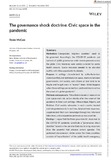The Governance Shock Doctrine: Civic Space in the Pandemic
Abstract
Emergencies heighten societies’ need to be governed. Accordingly, the COVID-19 pandemic put systems of public governance under severe pressure across the globe. Civic freedoms were widely curtailed for public health reasons. Scarce resources needed to be allocated swiftly, with little opportunity for debate.Purpose:In settings characterized by authoritarianism, violent conflict, and restricted civic space, relations between governments, civil society, and citizens at best tend to be fragile and fraught even in “normal” times. What happens when these settings are rocked by a profound shock such as the onset of a global pandemic?
This article is based on research on civic space and civic action shortly after the onset of the pandemic in three such settings—Mozambique, Nigeria, and Pakistan. Civil society advocates in each country tracked and interpreted events in real time, debated their responses, supplemented their own knowledge through key informant interviews, and compared experiences across countries.
I argue that the three governments’ responses to the COVID-19 pandemic constitute a “governance shock doctrine,” after Klein’s argument (2007; 2020) that shocks bring responses from the powerful that advance certain agendas. This patterned phenomenon, visible across the three countries, consists of “securitization” of the public health emergency, suppression of dissent, extension and centralization of executive powers, curtailment of press freedoms, and tightened regulation of civic space, including online space. Civic activism navigated or combated these attacks in various ways.
Measures adopted in emergency situations have a tendency to persist, threatening to lock civil society into living with pandemic-era restrictions.


